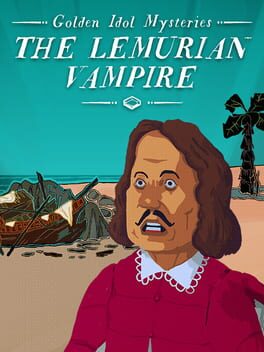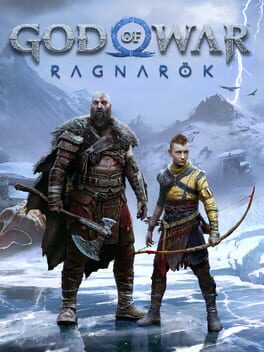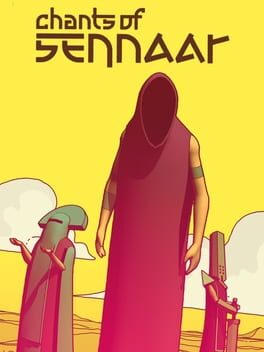harrisonmartin
Bio
Nothing here!
Badges

GOTY '23
Participated in the 2023 Game of the Year Event

2 Years of Service
Being part of the Backloggd community for 2 years
032
Total Games Played
000
Played in 2024
011
Games Backloggd
Recently Played See More
Recently Reviewed See More
Art direction is off the chain. Stylish as hell with a point of view. Gamifies language learning in a way I've never seen before. The gameplay system for decoding the languages is stunningly simple, elegant, and flexible. It rewards observation and inferences, and it genuinely tickled the part of my brain that I used taking language courses in school.
Only a couple of minor gripes. I echo those who feel the stealth seems shoehorned in. Easily the weakest element of the game. It's not what I'm here for. That said, at least it breaks up what would otherwise be gameplay largely made up of jogging up and down the environment. My only other complaint is that the difficulty scaling seems off. I found the third language the most challenging by far to piece together, while the last was disappointingly easy; translating almost all of it relies on linking cognates from the previous languages in a contrived way. This is a mechanic used sparingly throughout the rest of the game. It makes the final stretch somewhat less satisfying than it otherwise could be.
All in all, though, an exceptional title. Absolutely worthy of the praise it received in 2023.
Only a couple of minor gripes. I echo those who feel the stealth seems shoehorned in. Easily the weakest element of the game. It's not what I'm here for. That said, at least it breaks up what would otherwise be gameplay largely made up of jogging up and down the environment. My only other complaint is that the difficulty scaling seems off. I found the third language the most challenging by far to piece together, while the last was disappointingly easy; translating almost all of it relies on linking cognates from the previous languages in a contrived way. This is a mechanic used sparingly throughout the rest of the game. It makes the final stretch somewhat less satisfying than it otherwise could be.
All in all, though, an exceptional title. Absolutely worthy of the praise it received in 2023.
This second and final entry into the Golden Idol Mysteries saga consistently delighted me in all three new scenarios. Still, the bite-size experience ultimately left a bad taste in my mouth.
The newly introduced daypart mechanic is a standout of this DLC. It's a creative, compelling addition that allows the devs to wring even more intrigue out of each untimely death, with more runway pre and post-mortem to play with. The new setting is visually engaging in the signature Golden Idol art style. Its layout offers clues as to what's really going on in the narrative before you even realize what you're seeing. The new cast of characters is memorable, and each plays nicely off of the returning crew we came to know in the Spider of Lanka.
Overall, this set of mysteries felt easier to solve than the scenarios presented within the base game and Spider of Lanka. This, on its face, is fine—I have no problem with being made to feel smart. The balance of this group of puzzles is what really felt off, though, and that's where The Lemurian Vampire's issues begin.
In my experience, mystery two was significantly trickier to solve than either one or three. The steady increase in difficulty in the base game and consistent challenge of the Spider of Lanka were gone here. Granted, this is a relatively minor criticism, but it's indicative of the carelessness that soured the game in a major way for me.
The most glaring issue that took the shine off the Golden Idol apple for me is that this DLC was released while a catastrophic save function glitch still plagues the Switch version of the game. All progress is wiped whenever a player exits the game on Switch. This led to me (and a cursory Google search indicates many others) spending tedious hours re-clicking hundreds of word bank clues and filling in the puzzles we had already solved just to reclaim our lost progress. I went through this ordeal once already, up to the penultimate puzzle of the base game. Doing it for all base game puzzles plus the Spider of Lanka content would have been a non-starter. Thankfully, at the very least, Color Gray enabled a skip scenario function (activated by pressing minus and Y simultaneously) that allows players to mark mysteries done and move on to a starting spot of their choosing. But I had to dig online to find this. At this point, with two DLCs out on the platform, it's inexcusable that this bug still exists on Switch and that the solve for it isn't made known to the player in-game.
A noticeable number of typos, strange syntax choices, lines that seem unintentionally duplicated, and other textual quirks are also present in The Lemurian Vampire. While distracting, if these were the game's only demerits, I could look past them. But they're not.
I have every confidence that the lessons learned from all the Golden Idol projects so far will empower Color Gray to make The Rise of the Golden Idol a triumphant return to form. Until then, Lemurian Vampire is well worth playing. Just keep your Switch in rest mode.
The newly introduced daypart mechanic is a standout of this DLC. It's a creative, compelling addition that allows the devs to wring even more intrigue out of each untimely death, with more runway pre and post-mortem to play with. The new setting is visually engaging in the signature Golden Idol art style. Its layout offers clues as to what's really going on in the narrative before you even realize what you're seeing. The new cast of characters is memorable, and each plays nicely off of the returning crew we came to know in the Spider of Lanka.
Overall, this set of mysteries felt easier to solve than the scenarios presented within the base game and Spider of Lanka. This, on its face, is fine—I have no problem with being made to feel smart. The balance of this group of puzzles is what really felt off, though, and that's where The Lemurian Vampire's issues begin.
In my experience, mystery two was significantly trickier to solve than either one or three. The steady increase in difficulty in the base game and consistent challenge of the Spider of Lanka were gone here. Granted, this is a relatively minor criticism, but it's indicative of the carelessness that soured the game in a major way for me.
The most glaring issue that took the shine off the Golden Idol apple for me is that this DLC was released while a catastrophic save function glitch still plagues the Switch version of the game. All progress is wiped whenever a player exits the game on Switch. This led to me (and a cursory Google search indicates many others) spending tedious hours re-clicking hundreds of word bank clues and filling in the puzzles we had already solved just to reclaim our lost progress. I went through this ordeal once already, up to the penultimate puzzle of the base game. Doing it for all base game puzzles plus the Spider of Lanka content would have been a non-starter. Thankfully, at the very least, Color Gray enabled a skip scenario function (activated by pressing minus and Y simultaneously) that allows players to mark mysteries done and move on to a starting spot of their choosing. But I had to dig online to find this. At this point, with two DLCs out on the platform, it's inexcusable that this bug still exists on Switch and that the solve for it isn't made known to the player in-game.
A noticeable number of typos, strange syntax choices, lines that seem unintentionally duplicated, and other textual quirks are also present in The Lemurian Vampire. While distracting, if these were the game's only demerits, I could look past them. But they're not.
I have every confidence that the lessons learned from all the Golden Idol projects so far will empower Color Gray to make The Rise of the Golden Idol a triumphant return to form. Until then, Lemurian Vampire is well worth playing. Just keep your Switch in rest mode.
WIP
Final Fantasy XVI hits soaring heights in some regards while crashing and burning in others. I came out the other side of my ~70 hours with the game a little singed, but I enjoyed the ride nonetheless.
First, the excellent. It's been said many times in many places, but it bears repeating that this title delivers on the promise of spectacle in ways that are second to none. Eikonic clashes—duels between multi-story monstrosities—are epic, sprawling, and give the supernatural forces at play a well-earned gravity. The sense that this realm hangs in the balance often sat with me well after I finished a session with the game.
Combat develops into a satisfying, if simple, loop as the player progresses. The system has an irresistible rhythm to it, with credit due to Combat Direcot Ryota Suzuki and company. All boss encounters ebb and flow inside of a familiar but welcome structure. As Clive, you'll dodge and maneuver to stay alive while looking for windows to whittle down your foe's stagger meter. Delivering a decisive blow isn't always easy, as you'll be busy spinning plates to ensure your Eikonic ability cooldowns are satisfied before the next stagger window.
What underpins this gratifying combat is an ability customization menu that offers variety and nuance for those who care to explore it. Players who are inclined to experiment can learn to exploit combinations of weaker moves to great effect, while those who are uninterested can simply opt for all-out damage-dealing strategies that are satisfying all the same.
And do damage you will—millions of points' worth. I know because the game hilariously commits to the bit of displaying your damage at all times in battle, even during non-interactive cinematics. It never gets old to watch the number go up during a continent-rending collision of godlike beings.
Depending on how long you spend with the game, combat can overstay its welcome. There's not quite enough here to keep it feeling fresh through the whole run time, but it was enough for me for the majority of my run.
XVI's strengths don't just lie in its grand moments of conflict, though. It excels in some quiet moments as well. There are genuinely affecting arcs of character growth that pay off consistently throughout the dozens of hours you'll spend in Valisthea. A select few side quests flesh out secondary and tertiary character sketches into fuller portraits of comrades. I found myself sympathizing with their struggles and aligning with their goals. I was proud of my allies' progress as it happened. Oftentimes, that character growth arrived arm-in-arm with sweeping change occurring in their respective homes, which made previously visited areas feel alive and fluid in unexpected ways. The game goes to great lengths to make the player feel at home in Clive's base of operations too, though in ways that can't be adequately described without spoilers.
That said, the areas in which the game sings are all too often drowned out by sour notes when it fails spectacularly.
The first sore spot is perhaps not the game's greatest sin, but it was its most obvious and pervasive. The loot and crafting systems are so redundant and shallow that they feel like vestiges of a game two drafts removed from what was shipped. Finishing the game with thousands of pieces of valley madder and wyrrite, I had to wonder who it all could possibly be for. I did every single quest and hunt the game presented to me, and I still had no need for huge quantities of it. Why was I constantly being handed useless garbage as a reward for significant story beats? And why was I continuously being handed weapons that superseded the sword I just got after the last mission? It all boils down to a formula that makes the player want to completely ignore and disengage with it until it's time to craft the most powerful weapon and accessories.
As bad as those systems are, they are symptoms of Final Fantasy XVI's most noticeable mechanical affliction as an RPG: its economy. Several hours into the game, the title made collecting gil essentially irrelevant. I was never excited to get one bit of the currency, as I had precious little worth spending it on. I finished the game with upwards of 500,000 gil to my name, and I didn't want for anything. Diligent collectors of Orchestrion rolls will likely feel differently on this point, but those items' in-game value only strengthens my point; it's not hard to imagine the developers setting the rolls' ludicrous prices in a harried attempt to balance an economy that undermines the foundations of Final Fantasy as a role-playing game. In a story that hinges on the tensions of growing scarcity throughout the world, my Clive and his merry band felt none of it on the balance sheet.
•Common enemies
•Narrative beats w/in boss battles sometimes break the flow of combat and punish the player
•Map layout & exploration
•Side quests
•Low-priority cutscene fidelity & VO
•eikon battles sometimes hard to parse
•Slavery metaphor
•Women/Jill
•Race
•Predictable narrative beats
•Abandonment of political intrigue cultivated early
To wrap up,
•Overarching themes
•warm blanket
•stiff
•sexless
Final Fantasy XVI hits soaring heights in some regards while crashing and burning in others. I came out the other side of my ~70 hours with the game a little singed, but I enjoyed the ride nonetheless.
First, the excellent. It's been said many times in many places, but it bears repeating that this title delivers on the promise of spectacle in ways that are second to none. Eikonic clashes—duels between multi-story monstrosities—are epic, sprawling, and give the supernatural forces at play a well-earned gravity. The sense that this realm hangs in the balance often sat with me well after I finished a session with the game.
Combat develops into a satisfying, if simple, loop as the player progresses. The system has an irresistible rhythm to it, with credit due to Combat Direcot Ryota Suzuki and company. All boss encounters ebb and flow inside of a familiar but welcome structure. As Clive, you'll dodge and maneuver to stay alive while looking for windows to whittle down your foe's stagger meter. Delivering a decisive blow isn't always easy, as you'll be busy spinning plates to ensure your Eikonic ability cooldowns are satisfied before the next stagger window.
What underpins this gratifying combat is an ability customization menu that offers variety and nuance for those who care to explore it. Players who are inclined to experiment can learn to exploit combinations of weaker moves to great effect, while those who are uninterested can simply opt for all-out damage-dealing strategies that are satisfying all the same.
And do damage you will—millions of points' worth. I know because the game hilariously commits to the bit of displaying your damage at all times in battle, even during non-interactive cinematics. It never gets old to watch the number go up during a continent-rending collision of godlike beings.
Depending on how long you spend with the game, combat can overstay its welcome. There's not quite enough here to keep it feeling fresh through the whole run time, but it was enough for me for the majority of my run.
XVI's strengths don't just lie in its grand moments of conflict, though. It excels in some quiet moments as well. There are genuinely affecting arcs of character growth that pay off consistently throughout the dozens of hours you'll spend in Valisthea. A select few side quests flesh out secondary and tertiary character sketches into fuller portraits of comrades. I found myself sympathizing with their struggles and aligning with their goals. I was proud of my allies' progress as it happened. Oftentimes, that character growth arrived arm-in-arm with sweeping change occurring in their respective homes, which made previously visited areas feel alive and fluid in unexpected ways. The game goes to great lengths to make the player feel at home in Clive's base of operations too, though in ways that can't be adequately described without spoilers.
That said, the areas in which the game sings are all too often drowned out by sour notes when it fails spectacularly.
The first sore spot is perhaps not the game's greatest sin, but it was its most obvious and pervasive. The loot and crafting systems are so redundant and shallow that they feel like vestiges of a game two drafts removed from what was shipped. Finishing the game with thousands of pieces of valley madder and wyrrite, I had to wonder who it all could possibly be for. I did every single quest and hunt the game presented to me, and I still had no need for huge quantities of it. Why was I constantly being handed useless garbage as a reward for significant story beats? And why was I continuously being handed weapons that superseded the sword I just got after the last mission? It all boils down to a formula that makes the player want to completely ignore and disengage with it until it's time to craft the most powerful weapon and accessories.
As bad as those systems are, they are symptoms of Final Fantasy XVI's most noticeable mechanical affliction as an RPG: its economy. Several hours into the game, the title made collecting gil essentially irrelevant. I was never excited to get one bit of the currency, as I had precious little worth spending it on. I finished the game with upwards of 500,000 gil to my name, and I didn't want for anything. Diligent collectors of Orchestrion rolls will likely feel differently on this point, but those items' in-game value only strengthens my point; it's not hard to imagine the developers setting the rolls' ludicrous prices in a harried attempt to balance an economy that undermines the foundations of Final Fantasy as a role-playing game. In a story that hinges on the tensions of growing scarcity throughout the world, my Clive and his merry band felt none of it on the balance sheet.
•Common enemies
•Narrative beats w/in boss battles sometimes break the flow of combat and punish the player
•Map layout & exploration
•Side quests
•Low-priority cutscene fidelity & VO
•eikon battles sometimes hard to parse
•Slavery metaphor
•Women/Jill
•Race
•Predictable narrative beats
•Abandonment of political intrigue cultivated early
To wrap up,
•Overarching themes
•warm blanket
•stiff
•sexless





